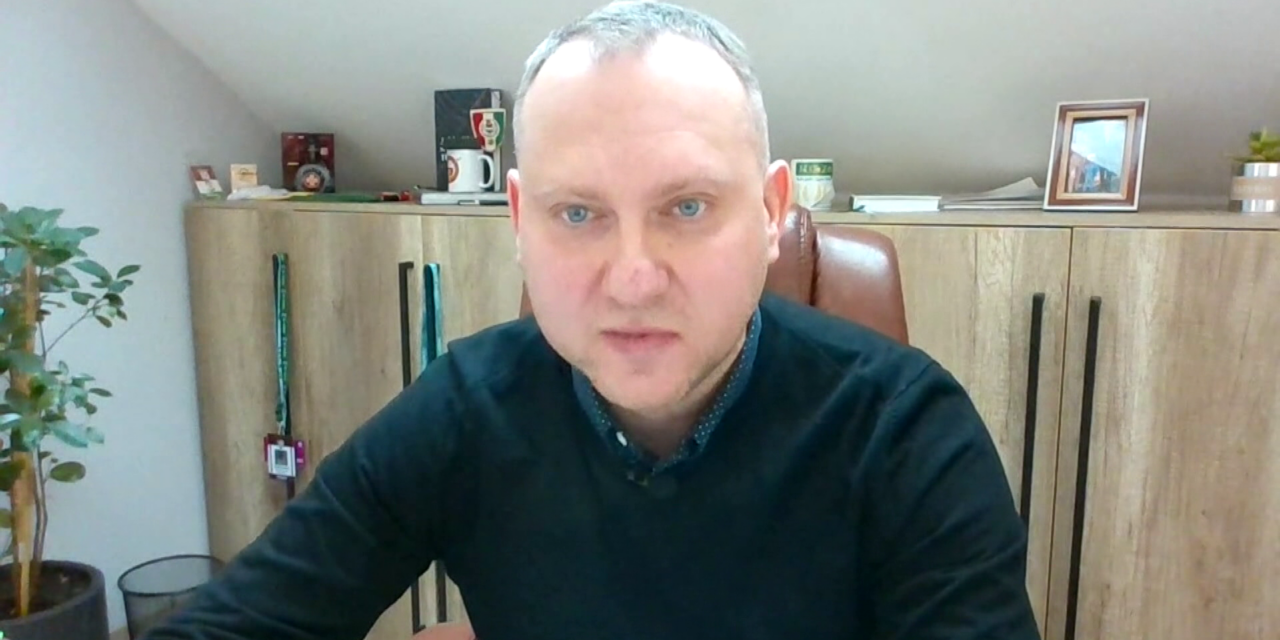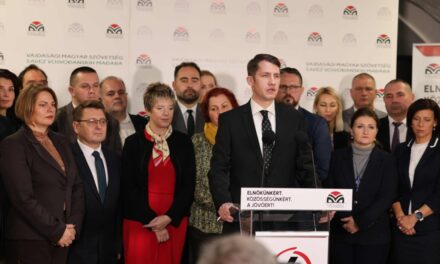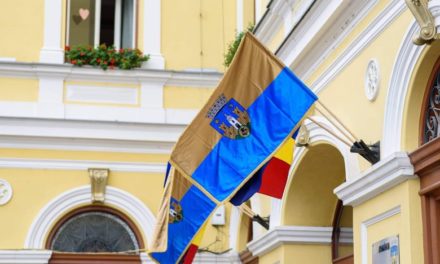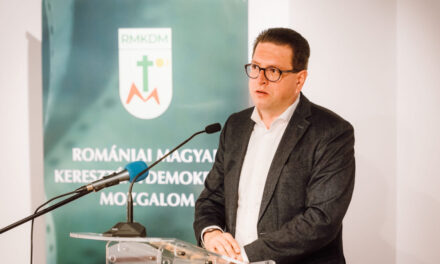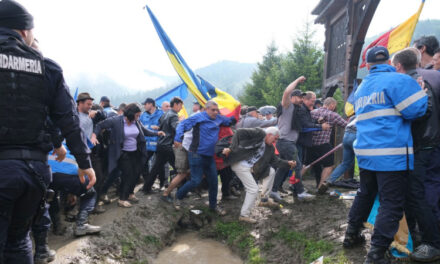At the end of December, the border guard made a decision - without any real legal background, since the new mobilization law has not yet been adopted - that from now on the exemption itself does not entitle you to cross the border, the Transcarpathian journalist stated.
According to Dunda, the action taken by the Ukrainian authorities affects everyone, the goal is to track down what are believed to be millions of men of military age, about whom the enlistment offices knew nothing until now. The director of the Kárpáti Igaz Szó newspaper also spoke about the fact that the improvement of Ukrainian-Hungarian relations can be brought about by the restoration of the rights of the Transcarpathian Hungarian community.
It has no anti-Hungarian edge, and it is not personal, but it does not comply with the effective Ukrainian mobilization law, that persons with exemptions are not allowed to leave the country and receive a military call-up, Transcarpathian journalist György Dunda told Krónika. The newspaper director of Kárpáti Igaz Szó and the correspondent of Hír Tv himself received a military call-up at the Hungarian-Ukrainian border.
although he is exempt from military service.
In response to our question as to whether the military draft given to him was "personal" or whether all persons in a similar situation receive the same treatment, György Dunda explained:
at the end of last year, the exit of all persons exempted from military service was prohibited.
"I dare to hope that I was summoned not on purpose, because of my journalistic activities, there is no question of that. It is more about the fact that at the end of December, as a New Year's "gift", exit was prohibited at border crossings for those who had been exempted from military service until now, so they could leave freely. There are a few categories in Ukraine - for example, those with large families who have at least three children, those who are raising their minor children alone, those who are disabled or those who care for a seriously ill close relative, and volunteers who bring humanitarian aid in large quantities from abroad, as well as those with higher education continuers - which have been able to cross the border freely until now.
On a family basis, I also belong to one of these categories, which is why I was entitled to the exemption, we were able to walk freely.
At the end of December, however, the border guard made a decision - otherwise without a real legal basis, since the new mobilization law has not yet been adopted - that from now on the exemption itself does not entitle you to cross the border. They are only allowed to go abroad if the person visits the military auxiliary office, undergoes the mandatory military medical examination there, and is officially conscripted into the army. But he can apply for exemption, because he is entitled to it, and after that he will get a stamp in his military record stating that he has been exempted. You must present this as it is the only way to exit the country. I became the victim of this tightening: I would have tried to travel to Hungary according to the old order, after being able to travel freely for two years, but after waiting for five and a half hours, they handed me a military summons to go and settle my situation before the selection board."
Dunda revealed the history to our newspaper.
The border guard acted without a legal background
When we asked whether the border guard really had the right to issue such a decree, he explained: this is the strangeness of the situation, since no relevant law has yet been passed.
"There is talk of a new mobilization law being adopted, which promises to be very strict, but it is still surrounded by great controversy, and it was even returned to the introducing government for revision by the parliament. Compared to this, the border guard still thinks that it has the authority to send everyone to the military auxiliary offices for data matching and exemption arrangements.
So much so that, starting in January, a member of staff from the Military Auxiliary Command was given a room at every Transcarpathian border crossing and examines the documents of male passengers of conscription age. And if someone cannot show the certificate from the military auxiliary command that he is entitled to the exemption and can leave the country, then they will give him a summons asking him to visit the military auxiliary command and take care of things.
As I emphasize: by the way, my documents entitling me to the exemption were available. So far, these have been strictly examined at the border crossing, but they have been accepted"
- pointed out the journalist from Ungvár. According to György Dunda, the reason for everything may be that they want to register everyone in the military, since one of the biggest problems with conscription is that the Ukrainian authorities simply do not know anything about many people of conscription age.
A member of the Ukrainian Economic Development Committee mentioned just the other day that, according to estimates, there are three and a half million men of military age living in Ukraine whose military records do not show where they live or work, so they are hiding from being drafted. The goal is therefore to track down everyone and invite them to a data reconciliation. The official information says that if someone is called before the enlistment committee, it does not mean that they will immediately be taken as a soldier, but that they will examine whether they are needed at the front, and if they have an exemption, they will recognize it.
"But what further complicates the situation is that the exemption is not handled on the basis of the right of the subject, but an application must be submitted after the examination by the military medical committee, the evaluation of which can take several months. So the restrictions are quite severe, they limit a person's movement"
said the journalist.
He added: he is still one of the luckier ones, because due to his exemption, he does not have to fear the real danger of being called up, of being taken to the front line. On the other hand, those who do not have an exemption and are hiding from the registration offices are in a much more difficult situation. György Dunda answered the Krónika's question whether, based on all of this, it is unlikely that the conscript had an anti-Hungarian edge, as the measure affects everyone.
"Those who are certified are given a summons to go and sort out their personal data, register themselves. A fine must also be paid. In principle, after the outbreak of the war, everyone had to voluntarily report to the military auxiliary headquarters within a week. But of course, only those who are sent there, who are caught on the street and taken in, or who receive an invitation, like me, appear there. But I think it is very important to record that there is no anti-Hungarian edge to this, but as a result of the continuous tightening of the ranks in Ukraine, they want to bring everyone to the auxiliary command, at least for data reconciliation.
Dunda emphasized.
Restoring the rights of Transcarpathian Hungarians is the key
In addition, our paper was also interested in the prospects of the Transcarpathian Hungarian community in the light of the Hungarian and Ukrainian Foreign Ministers Péter Szijjártó and Dmytro Kuleba's meeting in Hungary on Monday, as well as the possible Orbán-Zelenskyi meeting, whether the current tension between Budapest and Kyiv could ease and improve. the situation of the educational and language rights of Transcarpathian Hungarians. In connection with this, György Dunda explained: what can definitely be enjoyed and should be evaluated as a positive sign is that the two politicians were able to meet in Ungvár. They have met in European Union corridors before, but since the war, a personal meeting has now taken place in Transcarpathia for the first time. It is very important that they at least coordinate.
It was a strictly closed meeting lasting several hours, practically the whole day, so obviously we don't know exactly what was said, only what was made public at the press conference. But it is believed that the parties were able to discuss very difficult and very serious issues. But the fact that they talked, that they tried to move forward, to outline solutions, to restore the atmosphere of trust, to have a constructive dialogue - a working group is set up, eleven specific Hungarian proposals were made, which in principle an intergovernmental operative working group is trying to sort out within a ten-day deadline - these are encouraging signs. And the most important thing is that the Ukrainian-Hungarian conflict is not escalating any further, but both sides are clearly striving for a solution. Ukraine also has a well-understood interest in being on good terms with its neighbors.
Hungary can support and help EU integration, the basic condition of which is the return of the rights taken from the Transcarpathian Hungarian minority, the restoration of the 2015 conditions. Andriy Jermak, the head of the Ukrainian presidential office, stated that a possible meeting between Orbán and Zelenskiy in Kyiv is one step closer, but it is clear from the statements of the Hungarian foreign minister that this meeting will have a realistic chance only if the the situation of the Transcarpathian Hungarian minority. The minority framework law adopted by the Ukrainian side last December points in this direction, but the Hungarian side does not yet consider this to be sufficient.
Péter Szijjártó also admitted at the meeting that the law at least stopped the negative process, the negative spiral in which the issue of minority rights had been in recent years, and hopefully after the stop, it will clearly and definitely improve, and everyone the situation is settled acceptably for him.
But apparently solving the problems of the Transcarpathian Hungarian minority can also advance Ukrainian-Hungarian political relations," emphasized György Dunda, speaking to Krónika.
Featured image: HírTv

